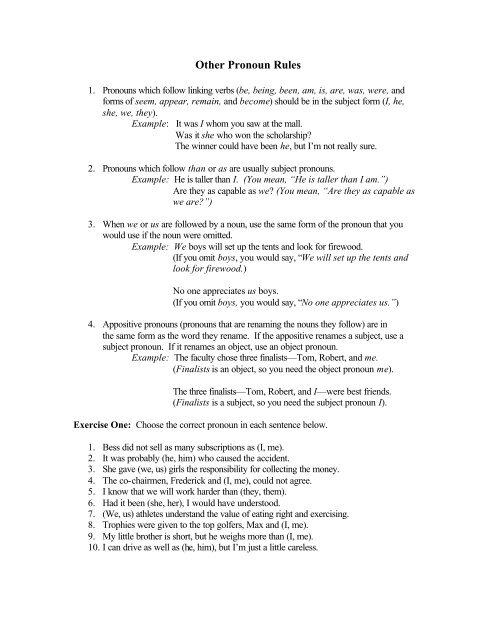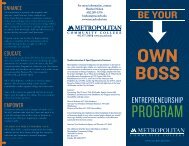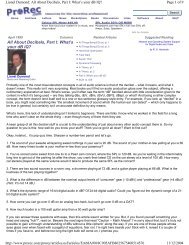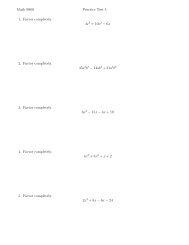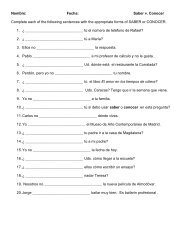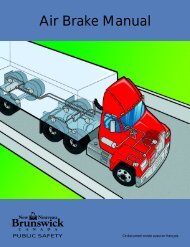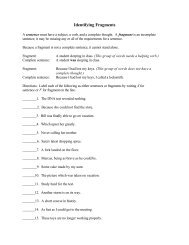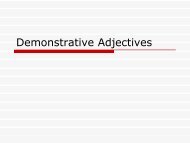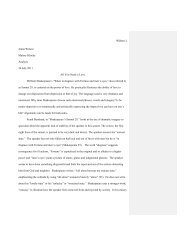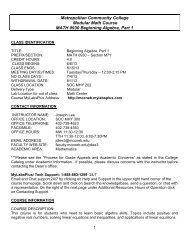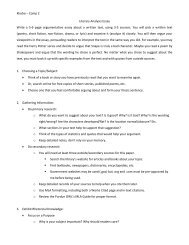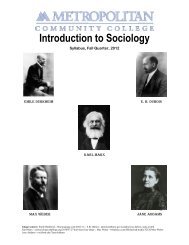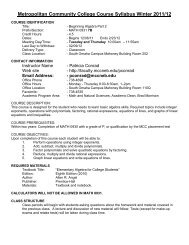Pronouns
Pronouns
Pronouns
You also want an ePaper? Increase the reach of your titles
YUMPU automatically turns print PDFs into web optimized ePapers that Google loves.
Other Pronoun Rules<br />
1. <strong>Pronouns</strong> which follow linking verbs (be, being, been, am, is, are, was, were, and<br />
forms of seem, appear, remain, and become) should be in the subject form (I, he,<br />
she, we, they).<br />
Example: It was I whom you saw at the mall.<br />
Was it she who won the scholarship<br />
The winner could have been he, but I’m not really sure.<br />
2. <strong>Pronouns</strong> which follow than or as are usually subject pronouns.<br />
Example: He is taller than I. (You mean, “He is taller than I am.”)<br />
Are they as capable as we (You mean, “Are they as capable as<br />
we are”)<br />
3. When we or us are followed by a noun, use the same form of the pronoun that you<br />
would use if the noun were omitted.<br />
Example: We boys will set up the tents and look for firewood.<br />
(If you omit boys, you would say, “We will set up the tents and<br />
look for firewood.)<br />
No one appreciates us boys.<br />
(If you omit boys, you would say, “No one appreciates us.”)<br />
4. Appositive pronouns (pronouns that are renaming the nouns they follow) are in<br />
the same form as the word they rename. If the appositive renames a subject, use a<br />
subject pronoun. If it renames an object, use an object pronoun.<br />
Example: The faculty chose three finalists—Tom, Robert, and me.<br />
(Finalists is an object, so you need the object pronoun me).<br />
The three finalists—Tom, Robert, and I—were best friends.<br />
(Finalists is a subject, so you need the subject pronoun I).<br />
Exercise One: Choose the correct pronoun in each sentence below.<br />
1. Bess did not sell as many subscriptions as (I, me).<br />
2. It was probably (he, him) who caused the accident.<br />
3. She gave (we, us) girls the responsibility for collecting the money.<br />
4. The co-chairmen, Frederick and (I, me), could not agree.<br />
5. I know that we will work harder than (they, them).<br />
6. Had it been (she, her), I would have understood.<br />
7. (We, us) athletes understand the value of eating right and exercising.<br />
8. Trophies were given to the top golfers, Max and (I, me).<br />
9. My little brother is short, but he weighs more than (I, me).<br />
10. I can drive as well as (he, him), but I’m just a little careless.
Exercise Two: Circle the incorrect pronouns in the sentences below. Refer to all<br />
rules for using pronouns.<br />
1. No one except (he, him) and Bernice went to the party.<br />
2. Although (he, him) and Carrie took their coats, they did not wear them.<br />
3. The class chose (he, him) and (she, her) to go to Washington for the<br />
inauguration.<br />
4. I did not know about (him, his) going to college at Ole Miss.<br />
5. No one is as smart as (she, her).<br />
6. This is (she, her), my cousin who works for the college.<br />
7. The winners, Billy and (I, me), will receive a savings bond.<br />
8. All but (he, him) and Thomas have completed the CPA preparation exam.<br />
9. Mother said it was (she, her) who bought the last armchair.<br />
10. Among (we, us) boys competition is fierce.<br />
11. Mother doubted the wisdom of (us, our) staying out late on a school night.<br />
12. (You, Your) studying for the test all week was a very wise idea.<br />
13. It was (he, him) who was upset over the new tax laws.<br />
14. The teacher said this book must be (yours, your's).<br />
15. Tyler told Chris and (he, him) about his camping trip.
Pronoun Case<br />
<strong>Pronouns</strong> are words which take the place of nouns. <strong>Pronouns</strong> change form, depending on<br />
how they are used in a sentence. Some pronouns are used as objects and some as<br />
subjects. The pronouns that change form are used correctly in the following sentences.<br />
Subject <strong>Pronouns</strong><br />
I went to the grocery store.<br />
He bought soft drinks and chips.<br />
She bought candy and cookies.<br />
We ate all afternoon.<br />
They wanted to share our food.<br />
Object <strong>Pronouns</strong><br />
Tom sent me a letter.<br />
I gave the letter to him.<br />
Mrs. Jones told her the story.<br />
We showed them the jewels.<br />
The bus driver likes us.<br />
Most students do not have problem with pronouns unless they are used in compound<br />
constructions. Notice the incorrect and correct uses of pronouns below.<br />
Incorrect<br />
Tom and me went to the store.<br />
The taxi picked up Mary and I.<br />
Correct<br />
Tom and I went to the store.<br />
The taxi picked up Mary and me.<br />
When deciding what pronoun to use in a compound construction, rewrite each part as if<br />
it were a separate sentence. Then it will be easy to choose the correct pronoun.<br />
Tom went to the store. I went to the store. (I is correct.)<br />
The taxi picked up Mary. The taxi picked up me. (Me is correct.)<br />
Note: Between is a preposition and takes an object pronoun. The correct construction is<br />
between you and me, not between you and I.<br />
Note: But is a preposition when it means except. It takes an object pronoun.<br />
Exercise: Correct each incorrect sentence by crossing out the incorrect pronoun and<br />
writing the correct pronoun above it. Some sentences are correct.<br />
1. Josh and him met on Saturday to work on their plans for the campaign.<br />
2. The judges gave both Robert and me a trophy since we tied for first place.<br />
3. Should Marie and she expect to see you at the game<br />
4. Both him and his sister graduated from Delta State University.<br />
5. The instructor told Paul and I to do more extensive research on our topics.<br />
6. Allen went to a Saints’ game with my brother and I.
7. Stacy and them are coming over to watch movies tonight.<br />
8. Me and my father have a good relationship even though he is strict.<br />
9. From the top of the mountain, Nancy and I could see the village.<br />
10. Between you and I, Mrs. Woods is not a very good cook.<br />
11. If you and I work together, we can finish more quickly.<br />
12. Ellen is such a good tutor that the children never want anyone but her.<br />
13. The old woman down the street promised Allison and I five dollars apiece if we<br />
would rake her yard.<br />
14. The lifeguard told my cousin and I to quit clowning around.<br />
15. The committee chose he and she to serve as co-chairpersons.
<strong>Pronouns</strong> Ending in –Self<br />
<strong>Pronouns</strong> ending in the word –self are called reflexive or intensive pronouns. Their use is<br />
sometimes confusing. Several rules regarding reflexive pronouns are listed below.<br />
• Never use the expression hisself because it is not a word. Use himself instead.<br />
• Never use theirselves. Use themselves instead.<br />
• Never use ourself or themself. Use ourselves and themselves.<br />
• Never use myself when you can use I or me. The same is true for himself, herself,<br />
and other reflexive pronouns.<br />
Below are several examples of the correct use of reflexive pronouns.<br />
• John wrote the paper himself, though his instructor thought that he had received<br />
help.<br />
• They paid for the house themselves, with no help at all from their parents.<br />
• We treated ourselves to chocolate sundaes.<br />
• I hurt myself when I tripped on the stairs.<br />
• I myself will supervise the instruction.<br />
Exercise: In each sentence below, cross out the incorrect pronoun and write the correct<br />
pronoun above it. Some sentences are correct.<br />
1. Jonathan and myself will pick you up at the airport this evening.<br />
2. I had told myself that I would be careful, but I became distracted by the radio.<br />
3. We all gave ourself a pat on the back when the performance was over.<br />
4. They theirselves will do the carpentry work because they do not trust anyone else to<br />
do the job right.<br />
5. Mark and himself will cook supper for the entire team.<br />
6. He himself will deliver the package.<br />
7. We hurt only ourselves when we do less than our best.<br />
8. Do you want to join Rob and myself for dinner this evening<br />
9. Matt cheated hisself by quitting the team.<br />
10. She gave herself permission to go off her diet, but she still felt guilty.
Using Who and Whom<br />
The pronouns who and whom are often confusing. Who is a subject pronoun and whom is<br />
an object pronoun, but many students have trouble determining subjects and objects. An<br />
easy way to decide whether to use who or whom is to substitute the words he and him.<br />
Wherever the word he is appropriate, the word who can be used. Wherever the word him<br />
is appropriate, whom can be used.<br />
Example:<br />
Example:<br />
Example:<br />
Example:<br />
(Who, Whom) is responsible for the accident<br />
Substitute he or him for who or whom.<br />
He is responsible for the accident.<br />
Who is responsible for the accident<br />
The man (who, whom) was driving the Mercedes is responsible.<br />
Take out the words, (who, whom) was driving the Mercedes.<br />
Substitute he or him.<br />
He was driving the Mercedes.<br />
The man who was driving the Mercedes was responsible.<br />
(Who, Whom) did the committee choose as chairman<br />
Turn the question around and substitute he or him.<br />
The committee did choose him as chairman.<br />
Whom did the committee choose as chairman<br />
Mr. Adams was the man (who, whom) the committee chose.<br />
Take out the words, (who,whom) the committee chose.<br />
Turn the clause around and substitute he or him.<br />
The committee chose him.<br />
Mr. Adams was the man whom the committee chose.<br />
Exercise 1: Fill in each blank below with who or whom.<br />
1. I know _____________ you should ask to coordinate the service project .<br />
2. We appointed only those ____________ we knew would do an excellent job.<br />
3. That is the girl _____________ bought my mom’s old van.<br />
4. ____________ played the violin solo in the Christmas concert<br />
5. With _______________ was she speaking<br />
6. People _____________ bring joy into the lives of others cannot keep it from<br />
themselves.<br />
7. The artist ____________ I was talking about is my cousin.
8. The technician _____________ repaired the computers was intelligent and<br />
efficient.<br />
9. ______________ is the woman sitting beside your mother<br />
10. The man ________________ the police arrested was not the man who robbed the<br />
bank.<br />
11. To ______________ did you send the flowers<br />
12. The guitar player _____________ you met at the party is well-known throughout<br />
the state.<br />
13. ________________ do most students believe to be the best contemporary<br />
novelist<br />
14. _______________ did the Student Government Association choose as president<br />
15. The people ______________ had waited in line for hours were growing restless<br />
and angry.<br />
Who and Whom can be joined with ever to form compound pronouns. Whoever is<br />
used as a subject and whomever is used as an object.<br />
Exercise 2: Fill in each blank below with whoever or whomever.<br />
1. You may give that book to __________________ wants it.<br />
2. You may invite _________________ you choose to the party.<br />
3. I think that ________________ takes this course will become a better writer.<br />
4. Do you realize that __________________ is elected president of the Student<br />
Government Association will have to make a speech in front of the faculty<br />
5. ______________ you select to serve on the committee will have a huge<br />
responsibility.<br />
6. The criminal, _____________ he is, ought to pay for his crime.<br />
7. Give the keys to ____________________ knows the password.<br />
8. _________________ installed the printer didn’t check to see that it was working<br />
properly.


